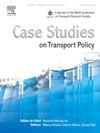Assessing the level of sustainable integration between inland water transport and other modes
IF 3.3
Q3 TRANSPORTATION
引用次数: 0
Abstract
Seamless travel is important in enhancing the overall user satisfaction with any public transit facility. The present study aims to assess the sustainable level of integration between land based multimodal transport systems with Inland Water Transportation (IWT) systems. Study employs Assessment Indicator Model (AIM) to arrive at Sustainable Seamless Travel Index (SSTI) and further evaluates the effect of different transport policies on the SSTI using Monte Carlo Simulation. Methodology is applied to assess the level of sustainable integration between Kochi water metro, Asia’s first fully electric water mass transit, with land-based transport modes (public transportation, intermediate public transportation and active transportation modes). Through literature, 21 sustainability indicators spanning across 4 sustainability dimensions were identified. Indicator values were measured through extensive user perception survey and inventory survey. The data collection was carried out at four water metro terminals. Further, expert opinions were obtained to assign weights to the sustainability indices. SSTI results concluded that water metro terminal at Vytilla is having a better sustainable integration compared to other three terminals. Best policy initiative for High court and Fort Kochi water metro terminals was facilitating “bicycle carry-it-along with water metro” while for Kakkanad and Vytilla water metro terminals it was “integration of bus timings with water metro”. The methodology adopted and the study findings will assist the policy makers, practitioners and the water metro operators in improving the sustainable integration of various transport modes with IWT, thereby leading to better overall user satisfaction.
评估内河运输与其他运输方式之间的可持续整合水平
无缝出行对于提高用户对任何公共交通设施的整体满意度都很重要。本研究旨在评估陆基多式联运系统与内河运输(IWT)系统之间的可持续整合水平。本研究采用评估指标模型(AIM)得到可持续无缝出行指数(SSTI),并利用蒙特卡洛模拟进一步评估不同交通政策对可持续无缝出行指数的影响。该方法用于评估亚洲首个全电动水上公共交通高知水上地铁与陆上交通方式(公共交通、中间公共交通和主动交通方式)之间的可持续整合水平。通过文献分析,确定了21个可持续发展指标,跨越4个可持续发展维度。指标值是通过广泛的用户感知调查和库存调查测量的。数据收集是在四个水上地铁终点站进行的。在此基础上,对各可持续发展指标进行了权重分配。SSTI的结果表明,与其他三个码头相比,Vytilla的水上地铁码头具有更好的可持续整合。高等法院和高钦堡水地铁终端的最佳政策倡议是促进“自行车携带水地铁”,而Kakkanad和Vytilla水地铁终端则是“公共汽车定时与水地铁的整合”。所采用的方法和研究结果将有助于政策制定者、从业员和水上地铁营办商改善各种运输方式与内河运输的可持续整合,从而提高整体用户满意度。
本文章由计算机程序翻译,如有差异,请以英文原文为准。
求助全文
约1分钟内获得全文
求助全文

 求助内容:
求助内容: 应助结果提醒方式:
应助结果提醒方式:


